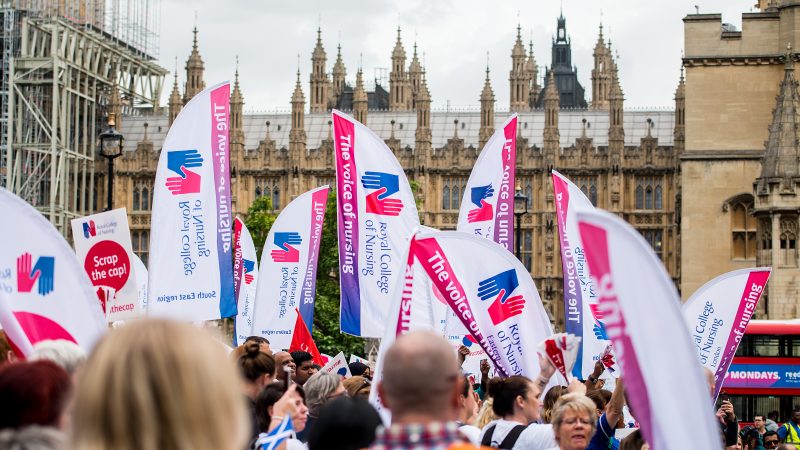
Today, the NHS will see what is reportedly the largest strike in its history, as nurses and ambulance staff across England walk out as part of their ongoing disputes with the government over pay and working conditions. Speaking to Sky News from a picket line this morning, Royal College of Nursing general secretary Pat Cullen accused the UK government of having “turned its back” on nurses, comparing its approach to that of the governments in Scotland and Wales where certain health unions have halted strike action following breakthroughs in negotiations. The union leader said nurses in England were being “punished” and “left behind” by Rishi Sunak and stressed that a further walkout tomorrow could “absolutely” be averted if the Prime Minister came to the negotiating table and made an offer on pay.
The GMB, the RCN and the Royal College of Midwives (RCM) announced last month that they would hold off on further strike action in Scotland following talks with the Scottish government. GMB’s Scotland organiser Keir Greenaway said Holyrood had “produced new proposals aimed at ending the long-running pay dispute”, including plans to backdate the value of any agreed terms for 2023-24 to January 1st. Cullen thanked the Scottish government for showing “a willingness to return to the negotiating table and to act to address the nursing workforce crisis” – though she warned that Nicola Sturgeon was in “no doubt” that strike action would recommence if the proposals outlined “do not deliver a significant improvement by the end of February”.
The GMB and the RCN also called off strike action in Wales scheduled for this week following a revised pay deal from the Welsh government. The Welsh government announced on Friday that it had offered health unions an extra 3% on top of the existing 4.5% pay increase, of which half is one-off and half consolidated. The pay offer will be backdated to April 2022. Ministers said the package also includes a number of non-pay commitments to “enhance staff wellbeing”. Both the GMB and the RCN attacked the UK government following the announcement. Cullen declared that Sunak’s “unwillingness to help nursing” had been “exposed as a personal choice, not an economic necessity”, while GMB’s Welsh NHS lead Nathan Holman said the progress in Wales had only been possible because the Welsh government had been willing to talk about pay, “a lesson for those in charge on the other side of the Severn Bridge”.
Planned strike action by Unite members in the ambulance service in Wales has gone ahead today, after general secretary Sharon Graham argued on Friday that it would be “wholly premature” for the union to talk about any deals being done in relation to the dispute. However, the union leader said this morning that a deal in Wales was “tantalisingly close”. The disputes in Wales and Scotland are far from resolved, as Graham’s comments demonstrate. But the cancelled walkouts show that progress can be made through good faith engagement on the issue of pay – as union leaders have repeatedly said – and further discredit Sunak’s argument that the continuing strike action in the health service in England is anyone’s fault but his own.
On LabourList this morning, we have a piece from shadow mental health minister Rosena Allin-Khan, marking the start of Children’s Mental Health Week. She writes: “Labour’s vision for future generations is one where mental health conditions are treated early. Adverse childhood experiences are the greatest driver of mental illness in adulthood – it’s just common sense to get mental health care right for young people in order to transform the future of the country’s mental health.”
Sign up to LabourList’s morning email for everything Labour, every weekday morning.



More from LabourList
‘The hope that kills you’: Reflections from the final day in Gorton and Denton
MPs, union leaders and organisations react to ‘bruising’ Gorton and Denton result
A gory night for Labour